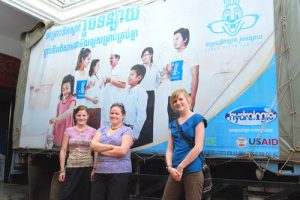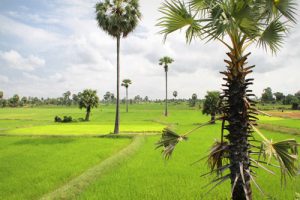Building a Factory, Building a Family – Ceramic Water Filter Production in Cambodia
Meet Haley, Shannon, and Stephanie – three of WaterSHED-Asia’s recent interns. They spent a packed week exploring our water and sanitation marketing programs in Cambodia. Here they write about their experience visiting Hydrologic’s ceramic water filter production facility where they interviewed some of the employees. Hydrologic Social Enterprise is the producer of the Rabbit-brand and Super Tunsai ceramic water purifiers.
BUILDING A FACTORY, BUILDING A FAMILY
Rural production facility creates jobs and fosters community
Travel with us to rural Cambodia, in Prey Veng Province where Hydrologic Social Enterprise has opened a new production facility for ceramic water filters. Here, most people come from agricultural backgrounds and end up working in the fields to practice subsistence living. More recently, people have started moving to the city to find income generating jobs in the textile industry. Both of these occupations are challenging work, and the presence of the new Hydrologic facility has provided an appealing alternative for employment.
At the production facility, the 12 workers take earthen materials (e.g. clay and ground rice husk) and mold them into clay pots. After the initial mold is made the pots are smoothed and dated before being fired in a kiln for 24 hours. Next they are soaked in water to reduce the arsenic content and tested for filtration quality. Out of each batch of 220 pots, usually 30 to 40 pots do not filter at an adequate rate for actual water purification. 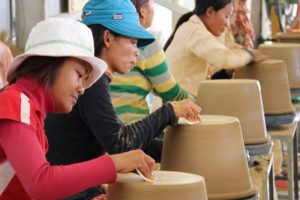 Finally the approved pots are painted with silver nitrate, which aids in killing bacteria. The entire process takes about 2 weeks, and by the end, each pot has been touched by the hands of many workers at the facility. For the most part, workers have the same task each day; there are teams of men who operate the molding equipment and the kiln, while several women do the smoothing and painting.
Finally the approved pots are painted with silver nitrate, which aids in killing bacteria. The entire process takes about 2 weeks, and by the end, each pot has been touched by the hands of many workers at the facility. For the most part, workers have the same task each day; there are teams of men who operate the molding equipment and the kiln, while several women do the smoothing and painting.
After talking to a handful of the employees, the general consensus was that work at the Hydrologic facility is less demanding and more enjoyable than working in the blazing hot fields and strict textile factories. Dara is a 25-year-old woman who was able to move back home after working in a textile factory in Phnom Penh. She says her boss here is much more concerned with the well-being of his employees, and goes above and beyond to make personal relationships with them. She also says the facility offers shade from the sun, a more relaxed and comfortable atmosphere, and a community of co-workers that have become like family to one another.
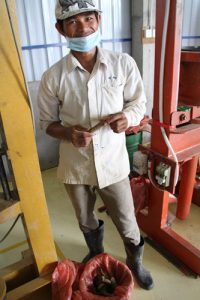 Although working at the Hydrologic production facility may seem like a great opportunity for many people, the job does not come without some compromises. In many cases, the workers actually live in different provinces, and have had to take up residence in the factory itself to keep their job. Teoun, who has worked at Hydrologic for over 6 years, relocated to the new facility to train its team of workers. She has four children living back at home, and says that although she misses them every day, having a job and being able to send them money is worth the sacrifice.
Although working at the Hydrologic production facility may seem like a great opportunity for many people, the job does not come without some compromises. In many cases, the workers actually live in different provinces, and have had to take up residence in the factory itself to keep their job. Teoun, who has worked at Hydrologic for over 6 years, relocated to the new facility to train its team of workers. She has four children living back at home, and says that although she misses them every day, having a job and being able to send them money is worth the sacrifice.
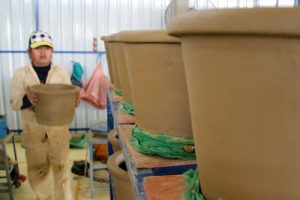 Many of the employees here are in similar situations. The men who run the kiln have work to do at 3 AM keeping the fire stoked and checking on the pots, and for this reason, they essentially live at the factory as well. Lee, a former construction worker, was offered a job after demonstrating his exceptional work ethic in building the new facility. He described how after work, everyone takes part in preparing dinner (including Mr. Surath, the General Manager) by chopping meat and vegetables and going to the market. This group ritual makes life away from home much more bearable for them.
Many of the employees here are in similar situations. The men who run the kiln have work to do at 3 AM keeping the fire stoked and checking on the pots, and for this reason, they essentially live at the factory as well. Lee, a former construction worker, was offered a job after demonstrating his exceptional work ethic in building the new facility. He described how after work, everyone takes part in preparing dinner (including Mr. Surath, the General Manager) by chopping meat and vegetables and going to the market. This group ritual makes life away from home much more bearable for them.
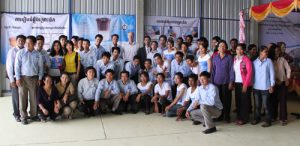 In many respects, what enriches the employees’ work experience is the community that they are able to build here. They make tough compromises for the jobs that they hold, including moving far from their families to live in the factory where they work every day. In most cases, they are not motivated by the product’s social impact, or that it has the ability to improve people’s lives. They keep coming back to work because they need a job to support their family. This is not so different than the way we all live our lives. The fact that this company provides people with a decent income and comfortable work environment, while also producing a socially responsible product, makes it a model of success.
In many respects, what enriches the employees’ work experience is the community that they are able to build here. They make tough compromises for the jobs that they hold, including moving far from their families to live in the factory where they work every day. In most cases, they are not motivated by the product’s social impact, or that it has the ability to improve people’s lives. They keep coming back to work because they need a job to support their family. This is not so different than the way we all live our lives. The fact that this company provides people with a decent income and comfortable work environment, while also producing a socially responsible product, makes it a model of success.
For more information on Hydrologic Social Enterprise visit their website.


